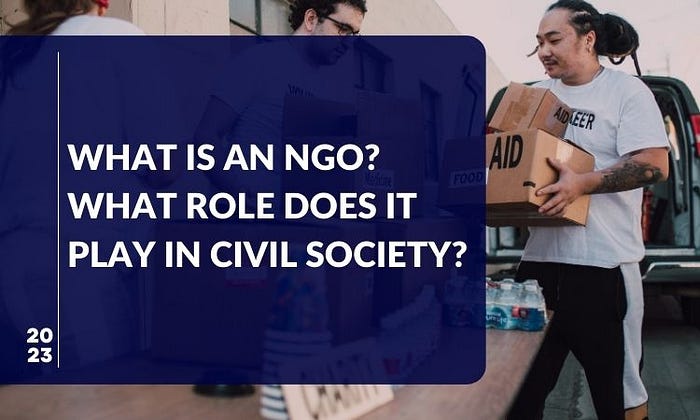What is an NGO? What role does it play in civil society?

What is an NGO? What role does it play in civil society?
Introduction
An NGO (non-governmental organisation) is a critical force in modern society, helping to shape civil society and propel
constructive change. Non-governmental organisations (commonly known as NGOs) are private businesses that are
not governed by any central authority. The purpose of this blog is to educate readers about nongovernmental organisations
(NGOs), their roles, their influence, and the difficulties they encounter.
What is a non-governmental organisation?
Non-governmental organisations (NGOs) are charitable groups that are not controlled by or beholden to any government.
They are usually run by volunteers for no financial gain and are supported by individual contributions.
There are many different kinds of NGOs, such as those that try to change policies, those that help people directly, and those
that are rooted in the community.
Volunteerism, non-profit status, and autonomy from official oversight are the defining features of NGOs.
Objectives Of An NGO:
Non-governmental organisations (NGOs) have many different focuses and goals in order to meet various societal needs and
advance social justice. Human rights, environmental protection, poverty reduction, healthcare, education, gender equality, and
disaster assistance are all areas where people often work together.
Non-governmental organisations (NGOs) frequently act as advocates for underserved groups, working to fill the voids that
governments and other institutions have created. Non-governmental organisations (NGOs) work toward a more stable and
equitable society by addressing specific problems.
Roles Of An NGO:
Non-governmental organisations (NGOs) contribute to societal, economic, and environmental development by playing a number of important functions.
Among these functions are:
- NGOs work to modify policies, sway decision-makers, and bring attention to critical problems. They advocate for social change and change in public opinion on behalf of those who have no other means of doing so.
- Many nongovernmental organisations (NGOs) work to aid marginalised communities by delivering essential services on the ground. They provide much-needed medical centres, schools, and disaster relief in areas where the government can’t afford to do so on its own.
- Organisations working to improve society frequently engage in research, data collection, and analysis. To aid policymakers, propel public dialogue, and heighten awareness of pressing issues, they provide reports and studies based on hard data.
- When it comes to bolstering people’s abilities and knowledge, non-governmental organisations (NGOs) play a key role. In order to help underprivileged communities become more self-sufficient, they offer training programs, workshops, and educational initiatives.
- Non-governmental organisations (NGOs) frequently form partnerships with other organisations, governments, and companies because they understand the need of working together.
Read More:https://vimpexltd.com/what-is-an-ngo-what-role-does-it-play-in-civil-society/
Comments
Post a Comment